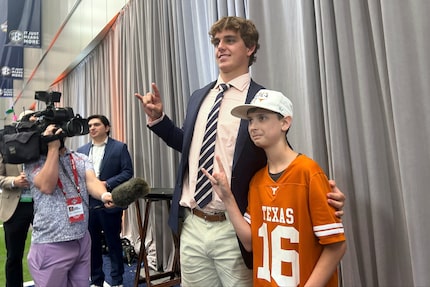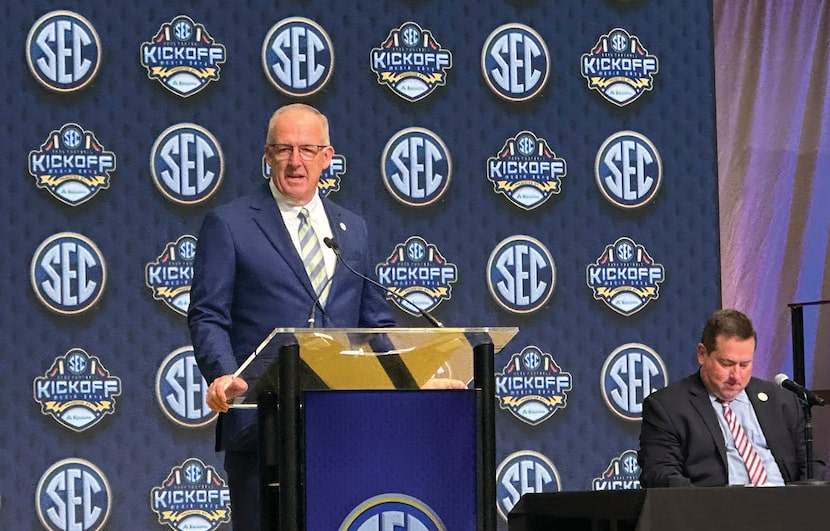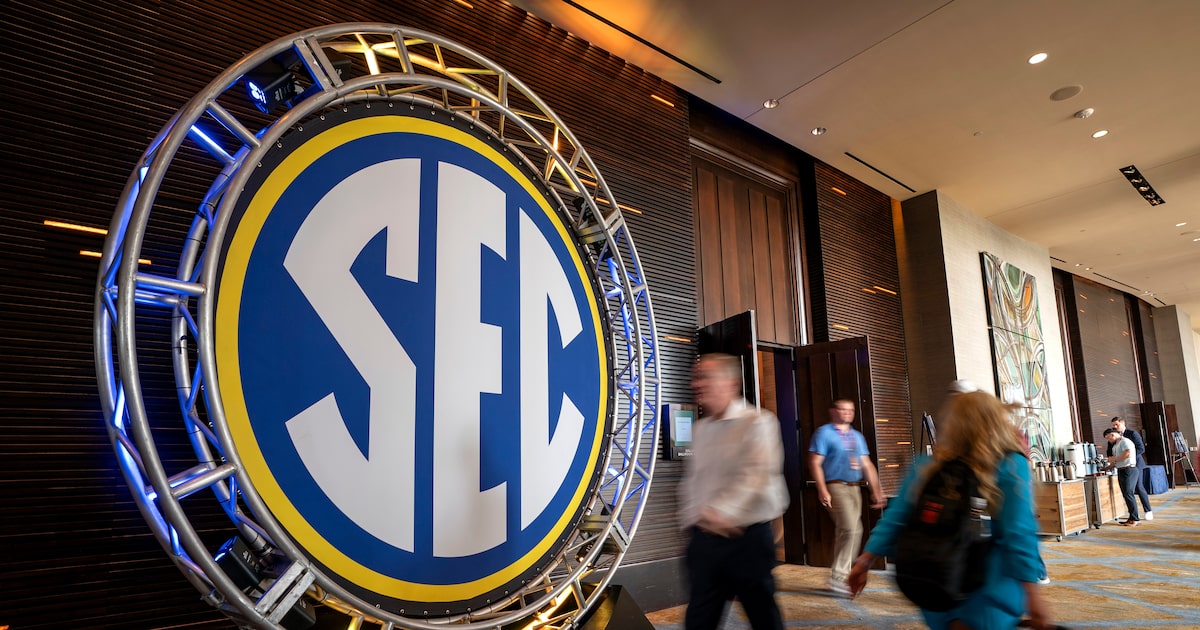The college football world descended upon Atlanta this week as players and coaches from all 16 teams in the SEC took the stage to preview the 2025 season.
From a viral snafu with Texas coach Steve Sarkisian’s introduction to a standstill between the SEC and Big Ten, plenty was discussed at SEC Media Days this week.
With “talking season” in the rearview mirror and football season around the corner, here are five things we learned from SEC Media Days
Texas wants to “finish the mission”
Texas College Sports
Texas has been close under Sarkisian, but not quite gotten over the hump. After back-to-back College Football Playoff semifinals appearances, the Longhorns are ready for the next step.
“The key for us this fall, we’ve got to go enjoy this journey,” Sarkisian said. “We need to be present and we need to be present in the moment, enjoy the journey and then ultimately finish the mission.
“We’ve been close. We’ve been there. We’ve been knocking on the door the last two years. But to go do that, we need to take it one step at a time as we embark on the summit that we’re looking for, and that’s going to take great discipline.”
 Texas quarterback Arch Manning meets super-fan Connor Petroziello, 13, at SEC Media Days in Atlanta, Ga., Tuesday, July 15, 2025.(Maura Carey / AP)
Texas quarterback Arch Manning meets super-fan Connor Petroziello, 13, at SEC Media Days in Atlanta, Ga., Tuesday, July 15, 2025.(Maura Carey / AP)
New starting quarterback Arch Manning will be key to finishing that mission. He admitted that, while he didn’t ever consider leaving Texas, it was tough being a backup.
“He’s got an unbelievable work ethic. And I think, if he stays true to himself, that’s going to help him navigate these waters as they present themselves,” Sarkisian said. “I think he’s prepared for the moment, but now it’s just time for him to go do it and enjoy doing it quite frankly.”
Related:Many expect Arch Manning to be great. Just good might be enough for Texas to win in 2025SEC or Big Ten?
After Michigan and Ohio State claimed the last two national championships, detractors are claiming that the SEC’s reign as the top conference in the sport is over. SEC players and coaches disagree.
“For all those of you who like to speculate about super-conferences, welcome to one,” SEC commissioner Greg Sankey said. ”We have common-sense geography, restored rivalries, record-breaking viewership.”
Missouri head coach Eli Drinkwitz spoke bluntly when asked if he thought the SEC still owned the title of top conference.
“The top? The top, as in number of draft picks in the NFL? Top as in most viewership? Overall top, deepest conference in college football? Look, the more teams you add to the tournament, there’s greater variance to it,” Drinkwitz said. “You’ve got 16 of the toughest competitors in the world who are head coaches in this league. We’re all driven to achieve the best, whether that’s internally or externally.”
Related:SEC players, coaches defend standing as top conference despite Big Ten’s recent successWhat’s next for SEC schedule, CFP?
If you were hoping there were concrete answers for these questions, you left SEC Media Days empty-handed.
The never-ending discussion surrounding the number of games in the SEC schedule rages on as schools debate whether there should be eight or nine games in the SEC slate.
Sankey said a decision on the 2026 schedule will come soon, though he did tell ESPN that he is in favor of nine games because it “would promote great interest through the year,” but also acknowledged the increased difficulty of SEC teams’ schedules if it went to nine games. Regardless, he knows the clock is ticking.
 SEC Commissioner Greg Sankey discusses the annual conference highlights with Chief Public Relations Officer for the University of Arkansas Kevin Trainor, sitting right, at the College Football Hall of Fame in Atlanta, Monday, July 14, 2025.(Hunter Dawkins / AP)
SEC Commissioner Greg Sankey discusses the annual conference highlights with Chief Public Relations Officer for the University of Arkansas Kevin Trainor, sitting right, at the College Football Hall of Fame in Atlanta, Monday, July 14, 2025.(Hunter Dawkins / AP)
“We have to make decisions (soon), if we’re going to nine games,” Sankey said. “If we stay at eight, it’ll probably be a little bit easier logistically.”
For the CFP, Sankey believes expansion “should be pursued,” but the SEC and Big Ten are at a standstill on what the expanded format would look like.
The Big Ten wants a 4-4-2-2-1 format, allotting four automatic bids to the SEC and Big Ten, while two automatic bids go to the ACC and Big 12. The SEC prefers five conference champions and 11 at-large bids.
“We had a different view coming out of [the SEC spring meetings] around the notion of allocations,” Sankey said. “The Big Ten has a different view. That’s fine. We have a 12-team playoff, five conference champions. That could stay if we can’t agree.”
Jackson Arnold’s OU departure explained
Former five-star and Denton Guyer product Jackson Arnold’s time at Oklahoma didn’t go as planned. In his first year starting for the Sooners, he was benched and later transferred to Auburn after the Sooners’ time in the SEC began with a resounding thud.
Oklahoma coach Brent Venables was candid on what went wrong for Arnold at Oklahoma, even admitting the Sooners tried to keep him around.
“Hate what happened,” Venables said. “We wanted to keep him. We tried to keep him, but I think he just needed a fresh start. I don’t want to speak for him, but he was wonderful.
“Unfortunately for him, everything around him wasn’t helping him be successful. So, he had no chance in some ways, under the circumstances.”
Arnold makes his return to Oklahoma when Auburn visits the Sooners in an early-season SEC clash on Sept. 20.
New era of NIL
During Sankey’s opening address, he discussed the arrival of revenue sharing in college football and the uncertainty surrounding it.
“In the middle of anything significant, it will get messy,” Sankey said. “That doesn’t mean you leave or in a marathon, it doesn’t mean you step off the course. The burden of making a new system work is certainly on commissioners and conference offices, but the responsibility is shared with our campuses and campus leaders.”
Lane Kiffin, Ole Miss’ always-outspoken head coach isn’t buying the salary cap rules. Under the settlement, each school can now share up to about $20.5 million with their athletes.
“I think it’s obvious people aren’t staying within the cap, so I think the whole thing will be, ‘What does that look like?’ That’s what we don’t know,” he said. “What does it look like when you don’t and what are the punishments for that? Do you win and that comes later?”
Related:NCAA House settlement FAQ: How will the historic ruling impact Texas college athletics?
As college athletics enter a new era of NIL, only time will tell how enforceable the new rules are. Coaches are building their rosters without knowing how the new rules surrounding revenue sharing work.
“[We need] something uniform that has some teeth to it, where it is what it is supposed to be,” South Carolina coach Shane Beamer said. “And if somebody is not doing what they’re supposed to be doing, it’s going to be enforced, and there’s going to be repercussions.”
Other coaches say the $2.8 billion antitrust settlement that began on July 1 levels the playing field and will be good for a lot of teams in college football.
“Financially with revenue sharing I think we are finally back on even keel with everybody, which we weren’t,” said Arkansas coach Sam Pittman. “If I was going to make an excuse, it would be financially is why we haven’t done quite as well.”
As the college football world continues to adjust to the new rules, the discourse surrounding revenue sharing could look quite different at next summer’s SEC Media Days.
Find more college sports coverage from The Dallas Morning News here.
